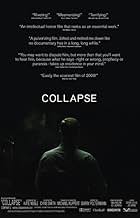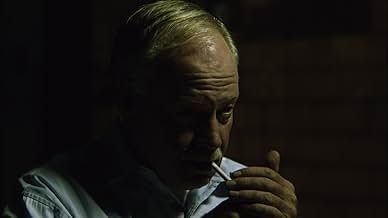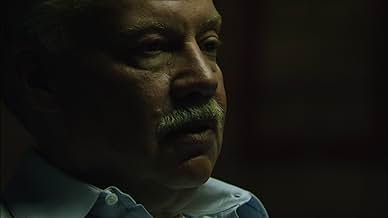अपनी भाषा में प्लॉट जोड़ेंA documentary on Michael Ruppert, a police officer turned independent reporter who predicted the current financial crisis in his self-published newsletter, From the Wilderness.A documentary on Michael Ruppert, a police officer turned independent reporter who predicted the current financial crisis in his self-published newsletter, From the Wilderness.A documentary on Michael Ruppert, a police officer turned independent reporter who predicted the current financial crisis in his self-published newsletter, From the Wilderness.
- निर्देशक
- लेखक
- स्टार
फ़ीचर्ड समीक्षाएं
Essentially what this film does is the equivalent of getting stuck at a bus stop listening to a guy who is convinced that the world is going to come to an end and that "they" are just keeping us in the dark for some reason. I don't mean this as negatively as it sounds but it is fair to say that this film doesn't hide the fact that at times Ruppert gets carried away with himself, doesn't always cope well with having the totally open stage that he has in the interview, gets passionate, is obsessive and does happen to make statements that (out of context) come off as paranoid and doomsday in nature. It is also fair to say that, unless you already share his mindset, that there will be several times during the film where he goes further than you will be willing to go or says things that either don't make sense, seem like a stretch or that you just plain disagree with.
Mostly the film lets him talk so it is only fair that these moments are left in the film because it does let us see that, being frank, Ruppert is obsessive and that perhaps some of what he says is exaggerated and extreme but this is not to say that he is 100% wrong. So while I personally don't agree with him on the imminent nature of the collapse of the oil reserves (or that they are significantly smaller than "they" are telling us), one cannot really argue that from plastics to fuel, we really have put all our eggs into the "oil" basket and that supplies are simply not infinite. Likewise, because all of our eggs are in one place, moving them may well be possible in small numbers but if we suddenly have no basket – we're going to have a load of broken eggs. At this level the film is engaging and provides plenty to think about and I think that Ruppert is at his best when he is talking generally because his basic points are hard to argue; it is only when he gets into specifics or gets tied up in details that he begins to say "they" too often or get a bit more emotional.
These moments hurt the film by hurting him, although in fairness since the documentary is technically about him, then it is all part of the film and is a good bit of balance. So yes, Collapse will lose you at some point but it will also engage you at many more; it isn't the most factual of documentaries nor is it the best in terms of structure but I found it mostly very engaging and it sent me onto news sites and opinion sites on the internet to read up on some of the less "opinion" related "facts" that it Ruppert presents. Worth seeing for its faults because it is engaging and provides much to think about, even if your conclusions may not lie as far out there as Ruppert's.
It seems I need to continue my comment based on IMDb policy of ten lines. That doesn't impress me as necessary, but I see the decision isn't mine. It's a great film, go and watch it. Anyway, hopefully this is enough to satisfy the rules. Why the needless wordiness IMDb? I liked the film and the participant, that isn't enough said? I'll bet many reviews never get posted based on the ambiguous ten lines rule.
I would like to have had more info on a lot of his quotes but I guess that would likely take an 80 minute documentary into like 3 or 4 hours (which I wouldn't have minded). I might just buy some if his books to take a look to see how much more in depth he gets on most of the topics he covers in this documentary.
For me, watching this, it was like it's about time. What I mean by that is finally someone who doesn't come across as a street corner preacher or a bona fide nut. This guy is just talking about real issues that matter, or at least they should matter.
I would surely say - the most important movie for the 21st century man.
We live in a fairytale where everybody has a hope that the ''good'' will overcome the ''evil'' no matter how bad it is, because it will be better... in the end that's the way fairy tales end, don't they? The ugly truth is that no magical wonderland exists, there is only now and here and this movie shows you WHAT ACTUALLY IS NOW AND HERE.
Collapse is an amazing documentary that works on several levels. We'll start with the first: Ruppert's analysis of the world around us is stunningly bleak. Our entire civilization is based on oil. This is fact. All transportation requires oil in some form. All manufacturing (and civilization as we know it) is based on energy, which is finite, and requires some oil in some form. Building the resources to harvest ANY energy source requires manufacturing and transportation, which requires oil. Cultivating food requires energy to produce and transportation to get to your grocery store or home. Even if we discover some new energy source - algae, for example, which is not addressed in the film - all the components needed to harvest or utilize that energy are oil-based. Even if we invent cars without tires (which require 8+ barrels of oil to make, PER TIRE), the plastics and metals and components in those vehicles all require oil as either a direct ingredient or as an indirect part of the manufacturing.
Now imagine a world without oil. See where this is going?
This film, and Ruppert, go much further than that. Oil dependency is just the appetizer. Then we get to Peak Oil (or the Hubbert Peak). Then an economy based on floated, imaginary, (fiat) money. And so on. Ruppert builds his case with hysterically grim anecdotes and considerable authenticity. It's difficult to disagree with him precisely because he doesn't allow 'theory' or partisan/ideological opinion to seep into the discussion. The facts are accurate. The conclusions... are up to you.
Let's talk about the film-making itself: Chris Smith's film is shot 'bunker-style' for effect. It works. There are hardly any miscues in the technical aspects, and the editing style is absolutely riveting and never boring. As pure entertainment, if we can call it that, this film will absolutely command your attention for 80 minutes. The film does not subscribe - one way or another - to Ruppert. It just shows him as he is and allows you to draw your own conclusions. Right or wrong, Ruppert's quest to seek this knowledge and tell it to the world has subtly destroyed him. Collapse works on an intensely personal level, too. This film burns itself into the mind. It's point blank brilliant.
Others have noted a major flaw in Ruppert's arguments, including the filmmaker himself: Ruppert does not allow for miracles or human ingenuity in his apocalyptic scenarios. Ruppert has already decided we've passed the point of no return and is now looking to "build the lifeboat on the Titanic". When confronted about this directly, Ruppert's non-answer more or less says that he won't trust his fellow humans to think a way out of this. Ruppert has so expertly identified the problems, but he has no answers. All his "hope" is directed at ways to survive what's to come. Again, right or wrong, this man absolutely believes what he's saying and is absolutely terrified. You should be, too.
What's the way out? Well, I personally choose to believe the first part of Ruppert's argument and disregard the second. We are in trouble. But I choose to have faith in my fellow man, that we can "fix the Titanic" before it's too late. In the meantime, you must see this film. See it, soak it in, let it shake you, and tell your friends. Draw your own conclusions. Ruppert's role is to sound the warning. Perhaps if enough people see this film, someone out there will figure out what to do.
क्या आपको पता है
- ट्रिवियाAccording to director, Chris Smith, they initially agreed the primary subject was supposed to be the CIA's connections to drug smuggling within the Iran-Contra affair, specifically Ruppert's collaboration with Pulitzer Prize-winning reporter Gary Webb's mid-1990's investigative series, "Dark Alliance." But Ruppert didn't want to talk about the CIA. Instead, he wanted to talk about peak oil, and its critical implications for the future.
- भाव
Michael Ruppert: It's kind of sad because we as a species have become so disconnected from the Earth. We don't have any real contact with the Earth. We don't have any sense of its functions, its feeling, its seasons, its timings.
- कनेक्शनReferenced in Film Junk Podcast: Episode 235: TIFF Report, Part 1 (2009)
- साउंडट्रैकCollapse
Performed by Karli Larsen, Didier Leplae, Joe Wong
टॉप पसंद
- How long is Collapse?Alexa द्वारा संचालित
विवरण
बॉक्स ऑफ़िस
- US और कनाडा में सकल
- $46,964
- US और कनाडा में पहले सप्ताह में कुल कमाई
- $7,800
- 8 नव॰ 2009
- दुनिया भर में सकल
- $46,964
- चलने की अवधि1 घंटा 22 मिनट
- रंग
इस पेज में योगदान दें



















